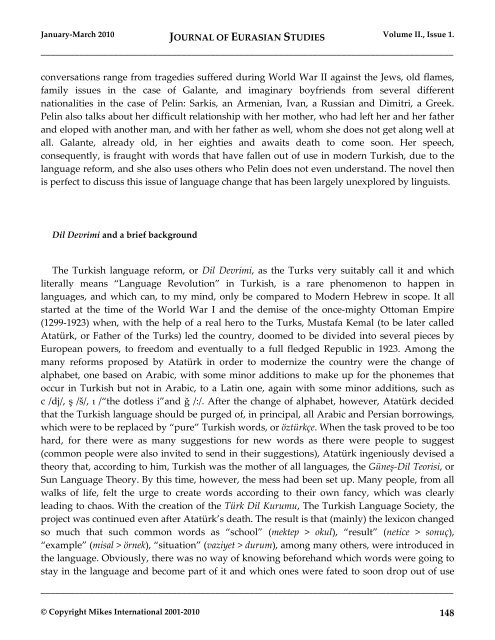EurasianStudies_0110..
EurasianStudies_0110..
EurasianStudies_0110..
You also want an ePaper? Increase the reach of your titles
YUMPU automatically turns print PDFs into web optimized ePapers that Google loves.
January-March 2010 JOURNAL OF EURASIAN STUDIES Volume II., Issue 1.<br />
_____________________________________________________________________________________<br />
conversations range from tragedies suffered during World War II against the Jews, old flames,<br />
family issues in the case of Galante, and imaginary boyfriends from several different<br />
nationalities in the case of Pelin: Sarkis, an Armenian, Ivan, a Russian and Dimitri, a Greek.<br />
Pelin also talks about her difficult relationship with her mother, who had left her and her father<br />
and eloped with another man, and with her father as well, whom she does not get along well at<br />
all. Galante, already old, in her eighties and awaits death to come soon. Her speech,<br />
consequently, is fraught with words that have fallen out of use in modern Turkish, due to the<br />
language reform, and she also uses others who Pelin does not even understand. The novel then<br />
is perfect to discuss this issue of language change that has been largely unexplored by linguists.<br />
Dil Devrimi and a brief background<br />
The Turkish language reform, or Dil Devrimi, as the Turks very suitably call it and which<br />
literally means “Language Revolution” in Turkish, is a rare phenomenon to happen in<br />
languages, and which can, to my mind, only be compared to Modern Hebrew in scope. It all<br />
started at the time of the World War I and the demise of the once-mighty Ottoman Empire<br />
(1299-1923) when, with the help of a real hero to the Turks, Mustafa Kemal (to be later called<br />
Atatürk, or Father of the Turks) led the country, doomed to be divided into several pieces by<br />
European powers, to freedom and eventually to a full fledged Republic in 1923. Among the<br />
many reforms proposed by Atatürk in order to modernize the country were the change of<br />
alphabet, one based on Arabic, with some minor additions to make up for the phonemes that<br />
occur in Turkish but not in Arabic, to a Latin one, again with some minor additions, such as<br />
c /dj/, ş /š/, ı /“the dotless i”and ğ /:/. After the change of alphabet, however, Atatürk decided<br />
that the Turkish language should be purged of, in principal, all Arabic and Persian borrowings,<br />
which were to be replaced by “pure” Turkish words, or öztürkçe. When the task proved to be too<br />
hard, for there were as many suggestions for new words as there were people to suggest<br />
(common people were also invited to send in their suggestions), Atatürk ingeniously devised a<br />
theory that, according to him, Turkish was the mother of all languages, the Güneş-Dil Teorisi, or<br />
Sun Language Theory. By this time, however, the mess had been set up. Many people, from all<br />
walks of life, felt the urge to create words according to their own fancy, which was clearly<br />
leading to chaos. With the creation of the Türk Dil Kurumu, The Turkish Language Society, the<br />
project was continued even after Atatürk’s death. The result is that (mainly) the lexicon changed<br />
so much that such common words as “school” (mektep > okul), “result” (netice > sonuç),<br />
“example” (misal > örnek), “situation” (vaziyet > durum), among many others, were introduced in<br />
the language. Obviously, there was no way of knowing beforehand which words were going to<br />
stay in the language and become part of it and which ones were fated to soon drop out of use<br />
_____________________________________________________________________________________<br />
© Copyright Mikes International 2001-2010 148

















